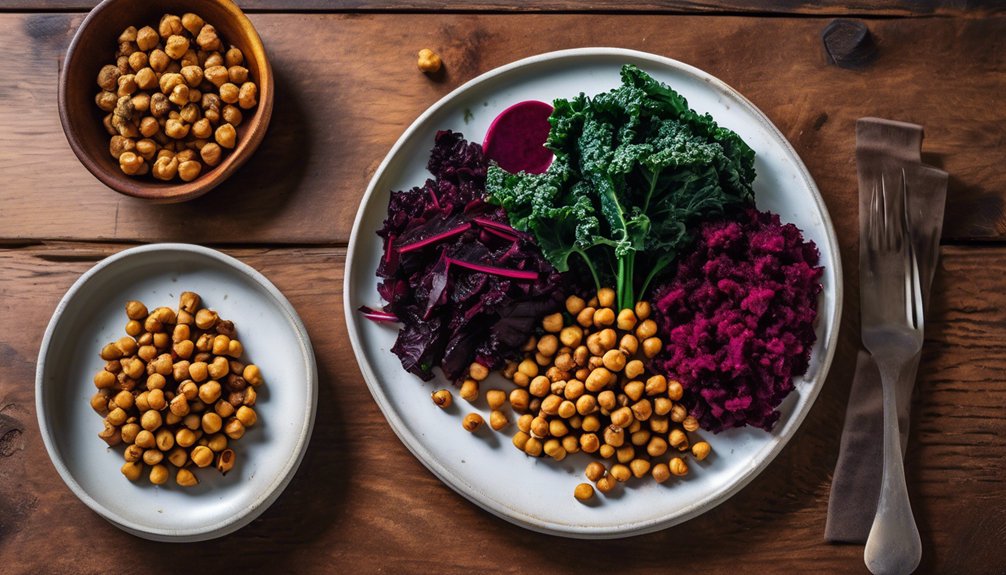Is Plant-Based Eating Right
Imagine a garden bursting with vibrant fruits and vegetables, symbolizing the potential of plant-based eating. This approach can offer numerous health benefits, like essential nutrients and lower saturated fat intake. Yet, it isn't a one-size-fits-all solution. Some individuals may encounter challenges, such as nutritional deficiencies. So, is plant-based eating the right choice for you? Understanding the balance between benefits and drawbacks is key to making an informed decision.
Key Takeaways
- Plant-based eating offers numerous health benefits, including reduced saturated fats and increased intake of vitamins, minerals, and antioxidants.
- It provides adequate protein sources from legumes, nuts, and whole grains, countering common myths about protein deficiency.
- Nutritional deficiencies, particularly in vitamin B12, iron, and omega-3s, may require attention through fortified foods or supplements.
- Adopting a plant-based diet can significantly lower your carbon footprint and promote environmental sustainability.
- Meal planning and exploring new recipes can ease the transition and enhance dietary variety for a balanced lifestyle.
Understanding Plant-Based Eating
Understanding plant-based eating goes beyond simply avoiding meat; it involves embracing a variety of whole, minimally processed foods that derive primarily from plants.
You might encounter some plant-based myths, like the notion that you can't get enough protein or nutrients without animal products. In reality, dietary flexibility allows you to tailor your meals to meet your nutritional needs while enjoying a diverse range of flavors and textures.
Incorporating legumes, grains, fruits, and vegetables makes it easier to create satisfying dishes that nourish your body. Remember, it's not about strict restrictions; it's about exploring new food possibilities and making mindful choices that resonate with your lifestyle.
You'll likely find joy in discovering how vibrant and fulfilling plant-based eating can be.
Nutritional Benefits of a Plant-Based Diet
While many people may not realize it, a plant-based diet offers a wealth of nutritional benefits that can enhance overall health.
You'll find plenty of nutritious protein sources, such as legumes, nuts, and whole grains, which can help you meet your daily needs without the saturated fats often found in animal products.
Additionally, a plant-based diet is rich in vitamins, minerals, and antioxidants, helping to combat vitamin deficiencies that can arise from less varied eating habits.
This way of eating supports heart health, boosts your immune system, and promotes better digestion.
Potential Drawbacks and Considerations
Although a plant-based diet offers numerous health benefits, it's important to consider potential drawbacks that can arise when transitioning to this way of eating. One concern is nutritional deficiencies, particularly in vitamin B12, iron, and omega-3 fatty acids, which are more readily available in animal products.
To counteract this, you'll need to be proactive about incorporating fortified foods or supplements into your routine. Additionally, social challenges can arise when dining out or attending gatherings, where plant-based options may be limited or non-existent.
Navigating these situations can feel isolating, so it's essential to communicate your dietary preferences to friends and family. By being mindful of these aspects, you can enjoy the benefits while maintaining a balanced approach to your health.
Environmental Impact of Plant-Based Choices
Making plant-based choices not only benefits your health but also has a significant positive impact on the environment. By reducing your consumption of animal products, you're likely lowering your carbon footprint, as livestock farming contributes heavily to greenhouse gas emissions.
Research shows that plant-based diets can lead to lower water usage and decreased land degradation, enhancing the sustainability benefits for our planet. Every meal you choose to fill with fruits, vegetables, grains, and legumes helps combat climate change and conserves natural resources.
It's a small shift for you, but it can lead to substantial environmental improvements. Embracing a plant-based lifestyle means you're not just nurturing yourself; you're also nurturing the Earth for future generations.
Tips for Transitioning to a Plant-Based Lifestyle
Transitioning to a plant-based lifestyle can seem daunting, but with the right approach, it can be a rewarding journey. Start by embracing meal planning; it helps you stay organized and ensures you incorporate a variety of nutrients.
Dedicate time each week to plan your meals, focusing on whole grains, legumes, fruits, and vegetables.
When grocery shopping, make a list based on your meal plans to avoid impulse buys. Opt for seasonal produce, as it's often fresher and more affordable.
Don't hesitate to explore new recipes and ingredients, which can make the transition enjoyable. Remember, it's okay to take small steps—gradually replacing meat and dairy with plant-based options can lead to sustainable habits that fit your lifestyle.
Personalizing Your Diet: Finding What Works for You
As you explore plant-based eating, it's important to recognize that there's no one-size-fits-all approach. Your journey should reflect your personal preferences and dietary restrictions.
Start by considering what foods you love and any health conditions that might influence your choices. For instance, if you're lactose intolerant, dairy alternatives can be a great way to enjoy plant-based meals without discomfort.
Experiment with different cuisines and recipes to find what resonates with you. Keep a food journal to track how different meals make you feel—this can provide valuable insights.
Frequently Asked Questions
Can I Still Eat Out While Following a Plant-Based Diet?
Absolutely, you can eat out while following a plant-based diet! Many restaurants offer diverse options, and you can always request menu modifications to suit your needs, ensuring a delicious dining experience that aligns with your lifestyle.
How Can I Ensure I'm Getting Enough Protein?
Imagine a vibrant garden bursting with beans, lentils, and nuts. To ensure you're getting enough protein, focus on protein-rich foods and explore complementary protein combinations, creating a delicious, balanced diet that nurtures your body.
What Are the Best Plant-Based Sources of Calcium?
For calcium, consider incorporating tofu alternatives like fortified soy products and almond milk into your diet. Leafy greens such as kale and collard greens also provide excellent sources, helping you meet your nutritional needs effectively.
Is Plant-Based Eating Suitable for Children?
Picture a vibrant plate filled with colorful veggies and whole grains. If you ensure nutritional balance, plant-based diets can support healthy childhood development, offering essential nutrients needed for your child to thrive and grow strong.
How Do I Handle Social Situations With Non-Plant-Based Eaters?
In social gatherings, communicate your dietary preferences ahead of time. For meal planning, suggest plant-based options alongside non-plant-based dishes. This way, you can enjoy the company while ensuring everyone feels included and satisfied.
Conclusion
In the end, embracing a plant-based lifestyle can be a vibrant journey, rich with flavors and health benefits. Just like a well-tended garden, it requires attention and care to thrive. While it offers a bounty of nutrients, it's essential to ensure your unique needs are met. By nurturing balance and flexibility in your meals, you can cultivate a diet that not only nourishes your body but also supports a greener planet. So, dig in and find what flourishes for you!










